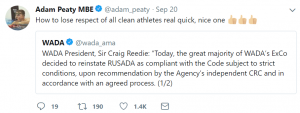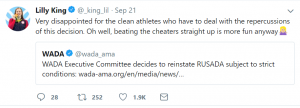Former Wada boss condemns anti-doping agency for lifting ban on Russians
The crisis engulfing the world anti-doping agency (WADA) continues as athletes, politicians and sports administrators across the world continue to criticise them for lifting the ban on RUSADA – the Russian anti-doping body at the centre of one of the worst drugs scandals in modern sport.
Former WADA chief Harri Syväsalmi has added his voice to the chorus of condemnation. Speaking from his home in Finland, Syväsalmi said, “I am incredibly disappointed and saddened by the decision WADA made on Thursday.”
He added, “This was a true step backward after all the hard work WADA has made during recent years; this will destroy the credibility of WADA.”
Syväsalmi, a founding member of WADA, who led the organisation as Director General from 2000 to 2003, went on to say that WADA now faces its greatest crisis in its history.
WADA, he claims, has succumbed to undue political influence, adding, “I’m sure that the decision would have been totally different if this were a smaller country.”
The accusation that WADA’s integrity has been compromised by Russian pressure and undue influence from supporters of the Russians on the International Olympic Committee could result in a loss of funding from countries such as the United States and Britain.
WADA receives half its funding from national governments, with the USA their biggest donor, providing a grant of $2.3million. The head of the United States Anti-Doping Agency, Travis T. Tygart, has emerged as one of its strongest critics, claiming that the agency has “delivered a devastating blow to the world’s clean athletes”.
His views were echoed by former Olympic champions, such as Lilly King and Daley Thompson who denounced the decision on Twitter.



Syväsalmi believes that “the only right decision would have been to postpone the decision until November. That would have allowed time for governments to analyse the situation.”
A professor of Applied Sports Science and an expert in anti-doping, John Brewer echoed this view by saying, “This has happened too quickly. I’m not sure that we can yet trust the Russian anti-doping agencies and the Russian Government.”
The condemnation has not been entirely universal. Kirsty Coventry – current chair of the International Olympic Committee’s Athletes’ Commission and winner of two swimming gold medals for Zimbabwe at the 2004 and 2008 Olympic Games – told Reuters news agency, “I believe our mandate is to protect all clean athletes and I believe there are clean Russian Athletes.”
“Blanket punishment is unfair to those who compete cleanly and even if there is only one clean Russian athlete, that athlete has the right to be protected. Assuming that every Russian athlete cheats is simply unjust.”
Her views are not shared by most athletes or Syväsalmi, who hopes that WADA can still recover its previous good reputation.
“When WADA was founded it was a very positive change in the work towards a doping-free sporting environment. Athletes were grateful for an independent organisation working towards cleaner sport.”
After stepping down from WADA in 2003, Syväsalmi continued to work as the Department Director for the Finnish Ministry of Culture and Education, subsequently becoming the Secretary General for the Finnish Center for Integrity in Sports. It was his spell there that led him to work as a consultant on ethics in sport and, deriving from his significant experience, he is a reputable speaker around the world.